|
Progressive Men of Iowa
1899
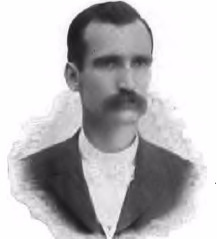 BARTOW, George L., of Sigourney, was born on a
farm in Jefferson county, Iowa, in 1860, where he lived until he was
18 years old. His father's name was George P. Bartow, a native of
Ohio, coming to this state in 1851, where he grew to manhood. He was
married in 1856 to Susan Baker, a native of Ohio, who came to Iowa
with her parents in 1853 and settled on a farm in Jefferson county.
She is still living in the town of Richland, Iowa. After receiving an academic
education, Mr. Bartow took up the study of medicine, graduating from
Scuder's Eclectic school of medicine in Cincinnati, Ohio, which
profession he followed until his death, October 28, 1888. He was in
good financial circumstances at the time of his death, owning 500
acres of land in Jefferson county, and considerable town property. BARTOW, George L., of Sigourney, was born on a
farm in Jefferson county, Iowa, in 1860, where he lived until he was
18 years old. His father's name was George P. Bartow, a native of
Ohio, coming to this state in 1851, where he grew to manhood. He was
married in 1856 to Susan Baker, a native of Ohio, who came to Iowa
with her parents in 1853 and settled on a farm in Jefferson county.
She is still living in the town of Richland, Iowa. After receiving an academic
education, Mr. Bartow took up the study of medicine, graduating from
Scuder's Eclectic school of medicine in Cincinnati, Ohio, which
profession he followed until his death, October 28, 1888. He was in
good financial circumstances at the time of his death, owning 500
acres of land in Jefferson county, and considerable town property.
George
began his education as most boys do on a farm, working in the summer
and attending school in the winter. In 1883 he entered the Pleasant
Plain academy, graduating from that institution in 1886 after
completing a three-years' course. After leaving the academy he
taught school for fourteen terms, being principal of the Richland
and Martinsburg schools. In 1887 he was appointed postmaster of the
town of Richland by President Arthur, holding the office for one
year. He was appointed railway postal clerk on the Cedar Rapids
& Kansas City railway postal route by President Cleveland, which
position he held until the first of January, 1890. He then resigned
from the mail service to become county superintendent of schools of
Keokuk county, to which office he had been elected at the previous
election. This position he held four years, being re-elected in
1892. After leaving this office he again entered school work, being
principal of the Thornburg schools for some time. He then became
editor and proprietor of the Sigourney Review, the official paper of
Keokuk county.
He was
married to Miss Belle Pfaff, of Sigourney, April 10, 1890. She was
one of the primary teachers in the Sigourney schools. They have two children, Vora
S., born July 20, 1892 and Vera A., born January 22, 1894. He is a
member of the Independent Order of Odd Fellows and a member of the
Methodist church.
Mr.
Bartow was admitted to the bar May 12, 1897, and is now a member of
the law firm of Gambell & Bartow, Sigourney, Mr. Gambell being
county attorney of Keokuk county.
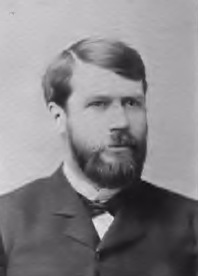 BROWN, Cassius M., of
Sigourney, has seen long service as a member of the bar of Keokuk
county. He was born November 9, 1845, on a farm near Mt. Vernon,
Ohio. His father was a native of Maryland, where he was born in
1802. He witnessed the march of the British army after the burning
of the capitol at Washington during the war of 1812. Removing to
Ohio in 1830, he located on a farm near Mt. Vernon and engaged in
farming until 1870, when he came to Iowa, and Keokuk county in 1872,
and there passed the remainder of his life, his death occurring in
1890. The mother was a Virginian by birth. Her maiden name was Ann
Holland. She died on the farm near Sigourney in 1884 at the ripe age
of 70 years. The father was of Welsh descent, while the mother was
of German. BROWN, Cassius M., of
Sigourney, has seen long service as a member of the bar of Keokuk
county. He was born November 9, 1845, on a farm near Mt. Vernon,
Ohio. His father was a native of Maryland, where he was born in
1802. He witnessed the march of the British army after the burning
of the capitol at Washington during the war of 1812. Removing to
Ohio in 1830, he located on a farm near Mt. Vernon and engaged in
farming until 1870, when he came to Iowa, and Keokuk county in 1872,
and there passed the remainder of his life, his death occurring in
1890. The mother was a Virginian by birth. Her maiden name was Ann
Holland. She died on the farm near Sigourney in 1884 at the ripe age
of 70 years. The father was of Welsh descent, while the mother was
of German.
The
subject of our sketch attended the district schools in his
neighborhood, the high school at Mt. Vernon and entered the
preparatory department of Kenyon college at Gambier, Ohio. He taught
several terms of district school, but was not financially able to
complete his college course, which was a great disappointment to
him. In 1868 he removed to Muscatine, Iowa, where for one year he
was associated with his older brother, Thomas Brown, in teaching in
the Muscatine academy. His older brother had graduated from Kenyon
college in 1861 and had engaged in teaching in Muscatine, Iowa,
where he is now successfully engaged in the practice of
law.
Before
leaving Ohio, Cassius had resolved to study law and had been reading
under the direction of W. C. Cooper, the colonel of his regiment.
Upon his removal to Iowa, he entered the office of Thomas Hanner, of
Muscatine, where he pursued his studies while teaching in the
academy and public schools of Muscatine county. He graduated from the law
department of the State university in 1871 and at once opened an
office in Sigourney, and has remained a member of the bar of Keokuk
county since. He was at one time in partnership with Judge Ben
McCoy, and from 1878 until 1892 was associated with the late Judge
E. S. Sampson.
He was
elected state senator in 1882 and served one term, this being the
only political office held by him, but he has been an active
participant in every campaign.
He was candidate from Keokuk county at the judicial
convention in June, 1898, for judge of the Sixth judicial district,
but failed to secure the nomination. He is and always has been a
republican.
He
enlisted in 1863 in the Ohio National Guards, and in the United
States service in 1864, being a private in Company A, One Hundred
and Forty second Ohio infantry. He is a member of Robert F. Lowe
post, G. A. R., past noble grand in the I. O. O. F., of which order
he has been a member since 1873. He is a member of the
Presbyterian church. He was
married June 18, 1874, to Miss Flora Sampson, eldest daughter of
Judge E. S. Sampson. They have four children, Eunice A., who is a
graduate of Sigourney high school, and attended Penn college one
year, and now teaching in the public schools of Keokuk county; Roy
C., who graduated from the high school of Sigourney and now teaching
in the public schools of Keokuk county and pursuing the study of law
in his father's office; Millie E., who is attending the high school
of Sigourney, and Helen, the baby of the family.
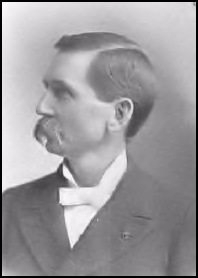 RIGGEN, Hon. John A., of What Cheer, Keokuk
county, was born in Stark county, III., October 29, 1841. His father
was a native of Ohio, tracing his Scotch-Irish ancestry to the early
settlers of Maryland and Delaware. His mother's name was Bothwell,
whose father, a native of Ohio, was of Scotch origin. Her mother was
of Irish parentage, and a product of Virginia. Both of these
families settled in Knox and Peoria counties, 111., in the early
30's and projected a generation of people known for their honest and
sturdy habits. RIGGEN, Hon. John A., of What Cheer, Keokuk
county, was born in Stark county, III., October 29, 1841. His father
was a native of Ohio, tracing his Scotch-Irish ancestry to the early
settlers of Maryland and Delaware. His mother's name was Bothwell,
whose father, a native of Ohio, was of Scotch origin. Her mother was
of Irish parentage, and a product of Virginia. Both of these
families settled in Knox and Peoria counties, 111., in the early
30's and projected a generation of people known for their honest and
sturdy habits.
Dr.
Riggen was not educated in youth but attended a few winter terms in
the country schools.
What additional knowledge he possesses was obtained from the
school of everyday life. He moved with his father to Missouri in
1859,and settled in what proved to be a strong secession community.
When the war broke out they unhesitatingly declared their adherence
to the cause of the union, and emphasized their sentiments by
enlisting in the union army. The father served three years in the
First Missouri cavalry, M. S. M., and returned home on account of
wounds and disability.
The
subject of this sketch enlisted June. 1861, joining the Eighteenth
Missouri Volunteer infantry at its organization in July following,
and was mustered out in July, 1865, serving a period of four years,
one month and fifteen days. During this time he was never absent
from his regiment except two weeks in the hospital from measles, and
two months on veteran furlough and recruiting service. He participated with his
regiment in important skirmishes and small engagements in Missouri
during the fall and winter of 1661. He was in the battle of Shiloh
(where he was wounded), siege and second battle of Corinth, Miss.,
in 1862, campaigns and skirmishes in West Tennessee, in 1863 The
numerous battles in which his regiment was engaged in the Atlanta
campaign, and Sherman's march to the sea, the march through the
Carolinas, the battle of Bentonsville and on through Virginia to
Washington and the grand review in 1865. He is proud of having
carried a musket nearly three years, although he was mustered out a
first lieutenant, having been promoted from the ranks for
"conspicuous bravery and highly meritorious service."
After
the war he taught school a few months and then began the study of
medicine, locating for the practice of his profession, at Johnstown,
Bates county, Mo., in 1869, where he maintained an extensive
practice for ten years, when he was compelled by failing health to
change, coming to Washington county, Iowa, in the spring of 1879,
removing to What Cheer, his present home, in 1884. During all this
time his practice has only been limited by his physical endurance.
He has for eighteen years been division surgeon for the Burlington,
Cedar Rapids & Northern railway. He is ex-president of the
Keokuk County Medical society, a member of the American Medical
association, the Iowa State Medical society, the National
Association of Railway Surgeons, and the American Public Health
association. He is a
member of most of the secret orders, including Odd Fellows, Knights
of Pythias, Mystic Shrine, and all the Masonic bodies up to and
including the thirty-second degree. He is also a member of the G. A.
R., Sons of Veterans, and the Military Order of the Loyal Legion of
the United States. He served seven years as commander of Posts 112
and 144, G. A. R. In 1888 he was elected senior vice-commander of
the department of Iowa, G. A. R. and had charge of the Iowa camp at
the national encampment at Columbus, Ohio, that year. In 1887 he was
the nominee, by acclamation, of the republicans of Keokuk county,
for representative, and came within five votes of being elected,
although the county was strongly democratic. He has been a member of
the city school board, and postmaster under Harrison, resigning in a
short time on account of poor health. He was the choice of his
county for district delegate to the national republican convention
in 1892, and was elected as an alternate from the Sixth district
that year. In 1893 he was elected state senator for the Twelfth
district. He was nominated by acclama-tion and elected by a majority
of 885, succeeding a democrat. During his term of four years he
rendered, in a quiet way, honest and faithful service to his
constituents and to the state. He was on the important committees of
ways and means, suppression of intemperance, railroads,
corporations, military, mines and mining, labor, highways,
elections, public health, and pharmacy. He was chairman of the
legislative committee, to visit the Independence insane asylum in
1894, and the Anamoea penitentiary in 1896. From the hour of his
election he positively refused to be considered a candidate for
re-election, his dislike for the duties of the office and his
persistent poor health, making this resolve absolutely
necessary.
When the
war with Spain was declared, he took an active interest in aid of
the government, and by his diligent efforts the city in which he
resides had the honor of a good representation in the Fiftieth Iowa
volunteers. He organized a squad of fifteen, accompanied them to the
recruiting station, and by his efforts raised money to pay the
expenses of all who were accepted or rejected He kept in touch with
the boys at the front, forwarded them money at Jacksonville, Fla.,
and when they returned gave his gratuitous professional services to
all who were sick. Upon the receipt of the news of the battle of
Santiago he promptly tendered, by telegraph through Congressman
Lacy, his immediate and gratuitous service to our wounded. As a
number of similar offers had been made, the surgeon-general accepted
the services of those who were nearer where they were needed.
Dr.
Riggen was married in 1868 at St. Joseph, Mo., to Mrs. Hannah
E. Mesley, with whose companionship and love he is still blessed.
She is the daughter of the late Mr. John E. Warner, of Syracuse, N.
Y. Their only child, Fannie E., is now the wife of Mr. T. C. Legoe,
a prominent attorney of What Cheer, Iowa. An adopted daughter, Cora
F., married Mr. Joseph
C. Rielly, a successful millinery dealer in St. Louis, Mo. Dr.
Riggen has a splendid plantation of 2,120 acres in the sunny south,
where he spends his winters.
He loves Iowa and her people, but his physical condition will
not permit him to risk the rigors of a northern winter
climate.
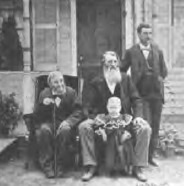 SINGMASTER, Samuel,
was born in Berks county, Pa., in the year 1807. His parents were
German farmers who came to America in their youth. SINGMASTER, Samuel,
was born in Berks county, Pa., in the year 1807. His parents were
German farmers who came to America in their youth.
Samuel
received very little schooling and such learning as he acquired came
to him by experience and observation during a busy lifetime. When a
boy he was placed as an apprentice to learn the tanning business He
served for three years in the city of Philadelphia, and at the end
of that time was hired by his master at a salary of $72 per
year. In 1831 he formed
a partnership with his brother and they operated a tannery of their
own until 1838, when a disastrous fire destroyed their business and
he abandoned it for the pursuit of farming. In 1840 he went to
Millerstown, Perry county, Pa., and began buying and selling cattle
and sheep. In those days, when transportation facilities were very
meager, he pur-chased his stock in Ohio and drove it long distances
to the Philadelphia market, riding on horseback and carrying his
money in a belt strapped about his body. He came westward to Iowa in
1843, located a claim in Keokuk county, returned to Pennsylvania the
next year and brought a family out with him to hold the claim, and
then brought his own family in 1845. The spot which he called home
then is his home today. Mr. Singmaster immediately launched into the
stock business, buying calves at 50 cents a head and selling the
steers as four-year-old's at $10 a head. He kept the heifer calves
and in a few years had a large herd. The cattle business prospered
and in 1875, in company with his sons, he began the importing of
horses from France. Their first importation consisted of six head of
Percherons. From that time on they made sixteen importations, one a
year, the largest in a single year numbering 140 head. The son,
William, did the importing from France, England and Germany. At
present the inventory of the Singmaster stock-that which is owned by
father and sons-is 500 head of registered male and female, and an
increase of 150 colts a year, Percheron, Shire, Clydesdale and
coachers; 100 head of grades; 600 head of cattle, mostly fat
ones.
Mr.
Singmaster has conducted this large business for fifty years. During
the late years he has had the assistance of his sons, who have
remained at home and shared the burdens of the rapidly increasing
business. In addition
to the stock business he has carried on quite a business in money
loaning at his home, Valley, Iowa, and has never foreclosed a
mortgage or met with any losses in that line.
He has
been a republican in politics all his life. His religion is of the
Lutheran faith. He was married in 1832 to Mary Seischalts, and to
them were born eight children: Charles F., born 1834; Sarah Ann,
Eliza, Thomas, James, Henry, William and Marietta. Two sons and two
daughters are now living. Upon the shoulders of the two sons,
Charles F. and Thomas, have fallen the entire management and conduct
of the large business. It must indeed be a source of pride and
gratification to him to know that the results of his life of toil,
hardship and privation have fallen into such safe keeping. C. F.'s
sons live and work together the same as their grandfather's family
did.
Since
the above was written, Samuel Singmaster has gone to his reward, and
in the Western Agriculturist we find the following
notice:
A
grand pioneer is lost to the west in the death of Uncle Samuel
Singmaster, at the ripe old age of 92 years. He died April 18, 1899.
He was born in 1807 in Pennsylvania, where he learned the tanner's
trade and worked for $72 a year for two years; then went to farming
and dealing in stock, and in 1843 he came west and lived in a log
cabin for several years. Thus began the pioneer life that has become
famous, as Singmaster & Sons, all over America and France, as
the largest draft horse breeders in America, the pioneer draft horse
breeders in Iowa.
He had
the foresight to see the great future for the American draft horse.
In 1875 his two sons, Charles and William, made their first
importation of four draft horses under his advice, he furnishing the
money, and in 1876 they imported six horses and rapidly increased to
100 and 140 head a year until the death of William Singmaster in
1891, who spent much time in France selecting the horses, since
which time Charles Singmaster and his sons Owen and Charles, Jr..
have conducted this extensive business, numbering now over 600
recorded draft horses. Samuel Singmaster and his sons owned about
10,000 acres of land and conducted three banks besides the large
horse business. He was
generous, kind and hospitable; loved and appreciated by all his
family and neighbors.
He was a friend to all who came to him in trouble for advice
and assistance. The great benefit to the state and to the nation in
the large draft horse business cannot be estimated, that Samuel
Singmaster established and his sons so successfully conducted under
his advice and instructions.
The
importation and the breeding of so many purebred draft horses has
added millions of dollars to the wealth of the west, and his son
Charles and his sons continue the business of Singmaster & Sons,
to perpetuate the good work established in the pioneer days of
Samuel Singmaster. The world is always better with the good work of
such men.
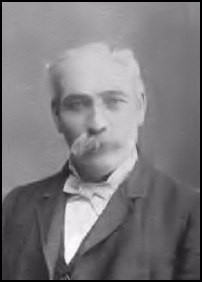 SMOCK, Finley M., of Keota, was born February 18, 1844,
in Indiana. His father, Rev. D. V. Smock, was a Presbyterian
minister and came to Iowa in 1853, locating at Birmingham, Van Buren
county, where he remained until the year 1858, removing thence to
Sigourney. SMOCK, Finley M., of Keota, was born February 18, 1844,
in Indiana. His father, Rev. D. V. Smock, was a Presbyterian
minister and came to Iowa in 1853, locating at Birmingham, Van Buren
county, where he remained until the year 1858, removing thence to
Sigourney.
Finley
M. enjoyed the benefits of our public school system and at two
different periods during his school days was enrolled in excellent
private schools. In 1859, at the age of 15, he entered a wagon shop
as an apprentice and was mastering this useful branch of mechanics
when the call to arms sounded through the land, calling on all loyal
citizens to throw down the implements used in peaceful pursuits, to
shoulder a musket in support of our flag and country. Responding to
President Lincoln's call, he enlisted in June, 1861, in Company P,
Fifth Iowa Infantry volunteers, and served under Capt. E. S. Sampson
and Col C. L. Matthies in that organization for more than three
years. He was badly wounded at Champion Hills, Miss., May 16, 1863,
through both thighs by a musket ball. In August, 1864, with other,
members of his company, he was transferred to Company G, Fifth Iowa
Cavalry volunteers, under Capt. J. M. Limbocker and Col. W. W. Lowe.
He was with Gen. J. H. Wilson's last cavalry raid of the war in
Alabama and Georgia and was mustered out of service in August, 1865.
Returning to Iowa, and Keokuk county, he again took his place
at the work bench, which pursuit he followed for many years. He was
married in 1868 to Mary E.
Stranahan, and a few years afterward located in Keota. Here
he followed various vocations, and was largely interested in the
development of that section of Iowa.
In the
fall of 1894, having received the nomination for clerk of the
district court of Keokuk county by the republican party, he was
successful in the canvass, and was re-elected for a second term. He
is now engaged in the real estate business at
Keota.
The information on Trails to the
Past © Copyright may be used in personal family history research, with source citation. The pages in entirety may not be duplicated for publication in any fashion without the permission of the owner. Commercial use of any material on this site is not permitted. Please respect the wishes of those who have contributed their tim and efforts to make this free site possible.~Thank you!
|